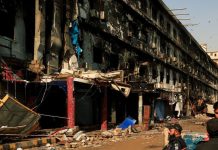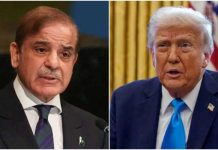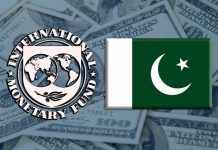From Sardar Shahab
LONDON: When Russian President Vladimir Putin was preparing for last month’s nationwide vote on potentially extending his rule until 2036, he let the veil slip on part of the calculation behind the constitutional change.
“If this doesn’t happen, then in about two years – and I know this from personal experience the normal rhythm of work of many parts of government will be replaced by a search for a possible successor,” Putin said in an interview with state TV channel Rossiya. “We must be working, not looking for successors.”
The Kremlin won the vote, declaring it a triumph. The constitution now will allow Putin to return to power for another two six-year terms. Independent monitor Golos, however, reported unprecedented vote fraud, and political opponents say the elaborate maneuvering over the ballot has weakened Putin’s legitimacy. Public discontent over Putin’s rule has begun to spill into the open in Russia’s Far East, where tens of thousands have marched in protest for the past three weekends.
Beyond Putin’s own comments to state TV, the Kremlin isn’t explaining its calculus about the constitutional change. But a first-hand account by a former insider of how the Kremlin tried to manage the handover of power in 2008, when Putin first faced a constitutional limit on his presidency, provides a glimpse into the under-the-carpet power struggles of Moscow’s ruling elite and some of the issues the Russian leader must grapple with.
Since at least 2006, former Kremlin adviser Sergei Pugachev told Reuters, Putin has been grappling with the question of succession. Once known as the Kremlin’s banker, Pugachev played a key role in Putin’s rise 20 years ago. His business interests spanned military shipyards, coal and construction, and he sat as a senator in parliament’s upper chamber. Today he is in deep conflict with his former allies, accused by Russian authorities of bankrupting the bank he co-founded, a charge Pugachev denies. He fled to Britain and then France, where he currently lives, after London’s High Court in 2014 ordered his assets frozen at Russia’s request.
Now, Pugachev has spoken for the first time about Putin’s decision-making in the run-up to 2008. He told how the president was often hostage to the will of his inner circle of former KGB men and associates from his hometown of St Petersburg.
The question of handing over power has always been the “biggest headache” of Putin’s rule, Pugachev told. For Putin, the succession “was always a serious, personal stress. He never intended to hand over control of the country to anyone.” Putin saw himself running Russia behind the scenes as the father of the nation, said Pugachev, but finding a successor who would go along with this plan “was always a big problem.” Kremlin spokesman Dmitry Peskov declined to comment about Pugachev’s account of events. In 2007, Pugachev was still a consummate Kremlin insider, close to many of the powerful men around Putin, the so-called siloviki, mostly drawn from Russia’s security services.




